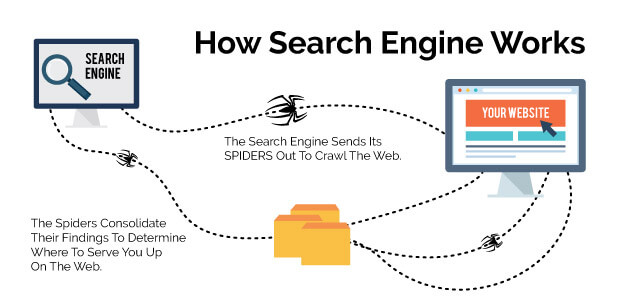If you are reading this post, you found it using a search engine. You probably know what a search engine is and how a search works.
A search engine is a simple tool with a very complex algorithm. Its job is to help users find the information they are searching for that is available on the world wide web or internet.
Search engines are like digital libraries with all the information you need, stored in their database. Instead of storing books like a library, it stores web pages. It is an answering machine that provides the most relevant answer to the searcher’s query.
As a webmaster, your first job is to show up for search results. If you are running an online business or blogs or just manage a website of your own, it is important that search engines index your site.
Unless your site is indexed, your content won’t be visible to the public. Indexing is the first step to SEO.
How Search Engines Work

Search engines work by scouring the internet for new content. All search engines use web crawlers (search engine spiders or bots) to crawl billions of web pages and index new web pages.
Search engine spiders crawl new pages and websites by crawling links from indexed sites. It then navigates the web by following the links from the newly discovered page.
Once the crawling process is finished the search engine organizes the content of the web pages and stores the information in its database.
Then the search engine starts to show those pages on SERPs for relevant keywords.
How Google Search Works & Ranks Pages

Google search is one of the most popular search engines across the world with a promising algorithm of its own.
Google’s search engine has its own mechanism and way of understanding searcher’s query and providing the best possible answer that is most relevant to the query.
Google processes over 5.6 billion searches every day and provides instantaneous results from its database of billions of webpages using its algorithm.
So, did you ever realize how Google’s search engine does this job so effortlessly and precisely? How come google never shows irrelevant results to search queries. How does Google filter all those pieces of information?
Yes, there is a filtration process involved and it’s fascinating.
Sourcing Information
All the information and web pages that you see on Google are not submitted individually by some person.
Google collects information from various sources but mostly from web pages, book scans, online public databases, images, and videos. Google also gathers information from user-submitted contents.
Site Crawler – How Google Index Sites

When you make a Google search, you might think that Google scours the whole worldwide web to provide you with relevant answers instantaneously.
But this is actually not the case. Google has a huge database of content that Google bots have discovered. This index is known as ‘Caffeine’.
Google provides searchers with information from its database instead of searching the whole internet.
The most relevant pages that match the search intent are ranked on top of SERPs.
Each search engines have their individual algorithm to rank web pages (search engine don’t rank websites’ it ranks web pages).
So if you are ranking on top of Google SERPs for a certain keyword, that does not mean you will rank on top of other search engines.
But as Google has the most users, people usually target to be on top of Google SERPs.
And frankly, if you are on top of Google search results it doesn’t matter if you are ranking on any other search engine or not.
Google has been dominating the search engine market. Recent data shows that Google owns over 90% of the search engine market share.
Which means out of the 4.39 billion internet users, the number of Google user worldwide is roughly about 4 billion.
Google search engine follows three important steps before it stores data in its database.
- Crawling
- Indexing
- Ranking
Crawling – What Is Search Engine Crawling

Crawling is the initial process in which Google search engine uses robots (also known as crawlers or spiders) to look for new content.
These robots find new content using links from indexed sites.
These contents can be in many formats. Mostly these are new web pages, images, videos, PDF, and digital files.
Googlebot starts fetching a few web pages and then follows the internal and external links on those webpages to find new URLs.
Using this algorithm Google site crawler is able to discover new contents and then add them to its database. This process is called indexing.
Indexing – What is Search Engine Index
After Google bots discover a new web page, Google understands the data of the web page by looking at the LSI keywords.
Google analyzes all the content stored on a web page such as videos, images, and digital files.
Then the search engine stores the information in Google index which is a huge database of all the content Google has discovered that they find good enough to be served to the searcher’s query.
Search Engine Ranking
When someone performs a Google search, search engines scour the index and look for all the relevant results.
Google orders the contents according to relevancy and site authority to make the user experience easier and better.
This ordering of search results according to keyword relevancy and site authority is known as ranking.
There are a lot of factors involved in Google ranking which they never disclose. So no one actually knows how Google ranks websites.
But there are some very important ranking factors that everyone already knows about.
- On-page SEO
- Off-page SEO
- Backlink Profile
- Domain Age
- Domain Authority
- Social Signals
- Page Speed
When a website rank higher for a certain keyword, it means it is most relevant to the searcher’s query. After the initial indexing, it takes some time to rank for keywords.
People like you and me might find it very simple but in reality, search engine algorithms are much more complex.





